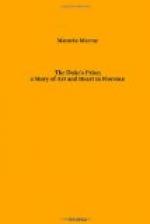“Fifteen pounds I have now. Good-again! I will have my watch yet to sell if anything happens. But nonsense, with fifteen pounds I can make a fortune. I may as well prepare now for prosperity at the antipodes.”
On the following morning there appeared among the strange crowds of people who throng the Australian capital, a man of most striking appearance. His air was high bred, but his clothes were coarse, and he walked up and down with a large barrow filled with confectionary. He looked around upon all the people with a smile of unutterable complacency, as though he were perfectly content with himself and the whole world.
It was Melville!
“Ha, ha, ha!” he chuckled to himself. “I think I see myself starving. By Jove, wouldn’t Aldborough laugh if he were to see me here? And my eldest brother, the baronet-the head of the family-hem-shouldn’t I like him to see me now! Ha, ha!”
“Confectionary, confectionary,” he cried, bursting into a louder tone of voice, which rang forth clear and deep-toned, as a bell. “Confectionary!” and then he added with grotesque modulations of his voice, “Confecctunarrry!”
“By Jove, how this reminds me of the little fellow in London. I’ll go the complete candy-seller. I might as well.”
“Ladies and gentlemen! Here’s your fine candy, lozenges, apples, oranges, cakes and tarts! Heeeere’s your chance!”
He displayed the most imperturbable calmness, walked up to ladies in the streets with the utmost nonchalance, to sell his things, and they, pleased with his uncommonly handsome face and fascinating manner, invariably bought.
“The ladies! Bless their kind little hearts!” said he, gazing after the last two whom he met. “And that little one-what eyes! what a smile! Who can she be, and where does she live? She looked so bewitchingly at me! I’ll follow, and see where she lives.”
Melville slowly walked after them, keeping at a proper distance. When they stopped at a house or shop, he also stopped at another, till they went on again. Our hero saw the younger occasionally glancing back toward him, and almost fancied that she encouraged him.
“What a lovely creature!” he muttered to himself. “Ah, there is her house, now. By Jove I have it!”
He marked it carefully, and passing by saw the name upon the door-plate. Henry Inglis.
“A finely sounding name. I heard her friend call her Emily-Emily Inglis. Ah, how dear is the name! If I were but rich, now. But I can adore her image till I become so. Yet what hope is there in this contemptible business Bah! never mind. I’ll stick to it till something turns up.”
On the following morning, Melville dressed as before, with his barrow of confectionary, went along Summer street where Mr. Inglis resided. It was a large stone house, four stories high, and one of the best in Sydney. He rang at the door and after a time Emily herself came. She started, and a half smile came across her beautiful face. Melville himself for the first time in his life, felt embarrassed-but he spoke up, and in the tone of a courtier, said:




